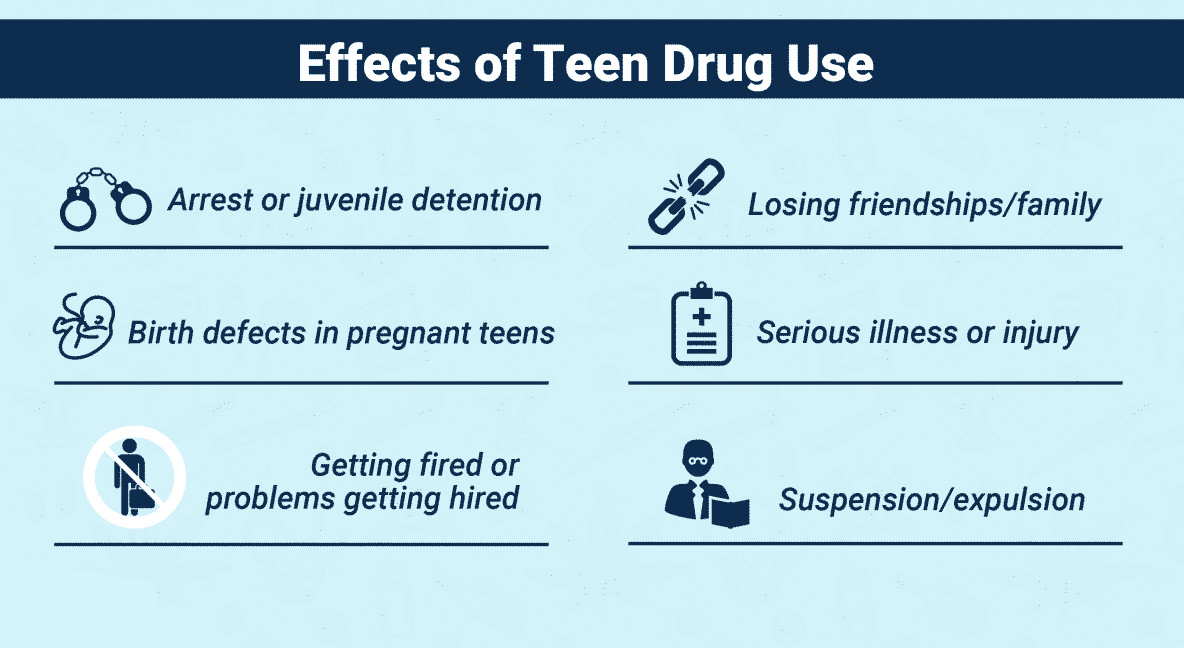The Consequences of Teen Drug Abuse
Teen drug abuse is rising, and parents need to understand the dangers. Teens who abuse drugs may be at an increased risk of developing an addiction as adults. Knowing the difference between drug abuse and addiction is essential, as many teens experiment with drugs but aren’t necessarily addicted. Additionally, teen drug abuse can have long-term cognitive and behavioral effects since the teenage brain is still developing. Let’s take a closer look at the consequences of adolescent drug abuse.
The Effects of Drug Abuse on Health
Drug use affects a person’s physical health in several ways. For example, people who use drugs are more likely to suffer from health problems related to their substance(s) choice. Heavy drinking can lead to liver damage while smoking marijuana increases a person’s risk of respiratory infections. Some substances can also cause heart problems or even death due to overdose.
Drug abuse also has psychological effects, such as anxiety and depression. The impact on mental health varies depending on the drug type used and how often it is taken. People who are under the influence may experience hallucinations or paranoia that can last for hours or days after taking the substance. Additionally, certain drugs like cocaine can lead to psychotic symptoms such as delusions and paranoia if taken in large doses or over a long period.
Long-Term Consequences
Teenagers should know that drug abuse can have long-term consequences beyond physical and mental health. Teens who use drugs are likelier to drop out of school, have difficulty managing their finances later in life, or develop legal problems due to substance use disorder (SUD). In addition, teens who start using drugs early in life may be at increased risk for developing an addiction when they become adults. Parents need to talk with their children about the dangers of teen drug abuse before it becomes a problem.
Signs Of Teen Drug Abuse
As teenagers become more independent, they may experiment with drugs and alcohol, but it can be challenging for parents to detect underlying issues. One way to do this is to look out for common signs of drug use, such as secretiveness or lying about activities and whereabouts, changes in eating and sleeping patterns, low motivation or interest in previously enjoyed activities, sudden changes in attitude or mood as well as physical symptoms like dilated pupils or red eyes. Parents must remain proactive regarding these changes and don’t hesitate to reach out and talk to their teens about what they may be going through. Through open and honest communication, parents can better understand the situation and take the necessary steps toward getting help.
Changes in mood or behavior.
Drug abuse among teens can take a devastating toll on their mental and physical health, but it can also manifest in unexpected and concerning personality changes. Teens abusing drugs may become reclusive and distant from family and friends or suffer from outbursts of aggression, irritability, and mood swings. Parents need to pay close attention to their teenagers’ behavior so that any changes caused by drug use can be caught early on and the best possible intervention methods can be employed swiftly.
Changes in appearance.
Drug abuse can drastically affect a teen’s appearance, often happening rather quickly. It is not uncommon for teenagers abusing drugs to neglect their hygiene and suddenly wear either disheveled or dirty clothing. Weight gain or weight loss also may occur if a young person is using drugs; if they start to gain or lose weight without explanation rapidly, it could be cause for concern. All these physical changes can signify that someone may be using substances and should be addressed promptly.
Changes in sleep patterns.
Many teens abusing drugs may suffer from disturbed sleep patterns, often sleeping more or less than usual. This sleep disruption can interfere with a teen’s ability to focus and pay attention in school or work. Parents must know these signs and talk to their teens if they notice anything unusual. Educating teens on the importance of getting enough restful sleep each night is also vital in helping them avoid drug abuse.
Changes in academic performance.
Substance abuse is a serious issue among teenagers and can significantly impact their academic life. A teen with an addiction may miss classes or do poorly on tests because of the influence of drugs or substances. Additionally, when a student is in school, they may be unable to concentrate due to substance abuse, resulting in lower grades and unfinished homework. Drug abuse also affects a teen’s mental health, leading to symptoms like anxiety, depression, and even suicidal thoughts, which further impair their ability to perform academically and ultimately create a downward spiral away from success at school.
Changes in friends or social activities.
When a teen abuses drugs, they may form relationships with others who are also using. This can be dangerous as it influences teens to continue their unhealthy behavior. In addition, they may stop engaging in activities that once brought joy and excitement, such as sports or club participation. The bond with the new group of friends can be strong, but they create an environment that reinforces negative behaviors rather than helping each other live healthier lifestyles.
Changes in hobbies or interests.
Drug abuse can have a severe impact on the lives of young people. Taking drugs is often associated with a decrease in day-to-day interests and motivation, resulting in teens no longer taking an active interest or enjoying hobbies or activities they used to enjoy. Simultaneously, drug use can be linked to increased risk-taking behavior, such as driving recklessly or engaging in risky sexual activity without protection from sexually transmitted diseases or pregnancy. These behaviors potentially risk the teenager’s short- and long-term health and well-being.

Why teens use or misuse drugs
Teen drug use is a complex problem that has many underlying factors. Not unlike most difficult struggles in life, teen drug use is influenced by a combination of variables, from the individual’s personality and family dynamics to their social connections. Studies have shown that adolescents who are more impulsive or more prone to risk-taking may be more likely to use drugs. At the same time, research also points out concerns with family communication and the influence of teen peer groups when it comes to teen drug misuse. Awareness of the situations surrounding your teen can help identify potential dangers and take proactive steps against drug use.
Common risk factors for teen drug abuse include:
A family history of substance abuse.
Substance abuse isn’t something far-removed from society. For some, a family history of substance abuse runs generations deep. It can be tough to break family cycles of addiction and the weight of stigma associated with them. There is help for those struggling with addiction in their families, ranging from counseling, peer support, or residential treatment – it is essential to reach out for assistance when needed. With commitment and bravery, it is possible to challenge the patterns of behavior that are part of a family history of substance abuse and overcome them for good.
A mental or behavioral health condition, such as depression, anxiety, or attention-deficit/hyperactivity disorder (ADHD).
Mental and behavioral health conditions such as depression, anxiety, and ADHD can affect people of any age or gender. Symptoms vary, and those suffering from the disease may experience reduced energy levels, decreased motivation, feelings of worthlessness, restlessness, or difficulty concentrating. However, medication and counseling can manage these conditions effectively in a safe and supportive environment. Seeking help is crucial if you notice symptoms associated with mental health issues, as early intervention will have the most positive results.
Impulsive or risk-taking behavior.
Impulsive or risk-taking behavior is an intriguing phenomenon that has been the subject of much research and discussion. Studies suggest that this behavior results from a complex interplay between neurotransmitters, hormones, and environment – all combined to contribute to individual decision-making. It has also been theorized that such behavior can be reinforced with positive rewards, meaning we may instinctively choose it in the following circumstances. While extreme forms of impulsive or risk-taking behavior can have potentially dangerous consequences, it does serve a purpose in both the natural world and human societies by encouraging exploration and evolution for the collective good.
A history of traumatic events, such as seeing or being in a car accident or experiencing abuse.
Traumatic events can have a substantial psychological impact on people, particularly during their formative years. Whether witnessing or being involved in a car accident, experiencing physical or emotional abuse, or dealing with other difficult situations, historical trauma is often stored in the subconscious and may resurface later in life. Symptoms of trauma can include insomnia, depression, anxiety, and nightmares. It’s essential for those who have experienced such events to understand the underlying emotions and speak to someone about what has happened if they feel overwhelmed. Professional help can be significant when seeking to properly process traumatic events from the past to move forward more healthily and positively.
Low self-esteem or feelings of social rejection.
Low self-esteem and feelings of social rejection can be incredibly difficult to cope with. These emotions can bring on a sense of depression and anxiety, but they can also be detrimental to one’s overall mental health over time. It is essential to face these issues head-on if you are struggling with them; talk to someone you trust and confide in, such as a family member, friend, or professional therapist. Additionally, seeking out support groups online or in person — either geared towards specific difficulties or more general ones — can also help to reduce the sense of loneliness and isolation one might feel during times of low self-esteem and thoughts of rejection. Regulating your thoughts and practicing self-compassion are critical steps toward managing social anxieties and building positive self-perception.
Trying substances for the first time is often more likely to occur when a teen hangs out in a social setting with their peers. This can be especially true of alcohol and nicotine or tobacco since these substances are legal for adults and seem safer than other substances even though they are unsafe for minors. The drive to fit in and feel accepted by peers is a solid motivator to try substances, and it can also seem like using substances will help them gain confidence among their peers.
When teens become friends with much older people, it can lead to riskier situations than they’re accustomed to. Without adults present and younger teens relying on their peers for transportation, it can leave them vulnerable to activities or substances they may not otherwise associate themselves with. Such circumstances could be further complicated if the teen is feeling lonely, dealing with stress, using substances as a coping mechanism, or out of curiosity to challenge family rules and rebel. Unfortunately, some teens may even underestimate the potential for harm due to an inability to recognize the consequences of these choices.
Health effects of drugs
Teenagers often feel the pressure to experiment and can be particularly vulnerable to using substances — with it being seen as an act of rebellion by many. In more extreme cases, teens may use substances that are legal for adults, such as alcohol or tobacco, but also medicines prescribed to other people and products familiar to homes. In addition, some teens feel that ordering substances online or illicit drugs like cocaine and methamphetamine will help them attain certain performance levels in sports or promote weight loss. Therefore it is essential to be aware of the risks associated with these behavior patterns to prevent vulnerable youth from experimenting with dangerous substances.
Drug use can result in drug addiction, severe impairment, illness, and death. Health risks of commonly used drugs include the following:
- Cocaine. Cocaine has been long known for its hazardous effect on the human body. Those who use the drug are at risk for dangerous, life-threatening conditions such as heart attacks and strokes. Seizures may also occur due to the intensity of the high cocaine produces. Users need to be aware of the danger consuming cocaine can cause; these risks should not be taken lightly and can have severe consequences. It is vital to consider personal safety when ingesting any mind-altering substances like cocaine.
- Ecstasy. Ecstasy has become increasingly popular as a recreational drug in recent years; however, serious health risks are associated with its use. Long-term drug abuse can cause liver failure and heart failure due to the damage it does to cells and tissues throughout the body. In addition, illegal versions of ecstasy often contain organic solvents, caffeine, amphetamines, or cocaine as fillers; these substances further increase the risk of dangerous side effects. It is essential that users know the risks and take steps to minimize them by staying informed about safer forms of use.
- Inhalants. Inhalants are chemical substances that, when inhaled, cause mind-altering effects. Long-term use risks severe health damage to the heart, lungs, liver, and kidneys. Serious complications from inhalant use can include death from cardiac arrest or asphyxiation. Significant organ damage can lead to permanent disability and decreased life expectancy. These risks should be heavily considered for any regular user of inhalants. While short-term use may seem harmless, long-term use can put a person at extremely high risk for physical and mental harm due to damaging the body’s most essential organs.
- Marijuana. While the effects of marijuana have been debated for decades, it is essential to remember that it still poses a risk. Users, particularly teens, are at risk for memory, learning, and concentration impairments. Early or frequent use of marijuana may increase the likelihood of developing psychosis later in life, such as schizophrenia or paranoia. Those with a pre-existing psychiatric disorder may experience an increased risk of depression and suicide if they turn to marijuana as a form of self-medication. It is crucial to be aware of the risks associated with marijuana so that everyone can make informed decisions about their health.
- Methamphetamine. Methamphetamine is an illicit and potentially dangerous drug linked to numerous physical and mental health problems. In particular, long-term use of methamphetamine or high doses can increase the risk of psychotic behaviors such as auditory and visual hallucinations, delusions, paranoia, and disorganized thinking. Regular users also develop a tolerance for the drug over time, leading to higher doses for the same effect. If not managed appropriately, this can further limit someone’s psychological resilience and exacerbate their risk of experiencing psychotic symptoms. Therefore, it is essential to be aware of the dangers associated with methamphetamine use so that people take necessary precautions when using this drug.
- Opioids. The opioid crisis is one of the significant public health problems of our time and continues to cause devastation in communities across the United States. Opioids are a powerful class of prescription drugs that provide effective relief from moderate to severe pain but are highly addictive and carry a significant risk of overdose. Those suffering from an opioid overdose sometimes exhibit a gradual slowing of breathing, which can become so dangerously low that it may lead to oxygen deprivation and even death. Doctors and nurses must now pay increased attention when prescribing or administering opioid medications and advise their patients on the potential dangers that come with them.
- Electronic cigarettes (vaping). Electronic cigarettes, also known as vaping, have become an increasingly popular lifestyle choice in recent years. Unfortunately, vaping is associated with a higher risk of smoking or marijuana use than in other contexts due to increased exposure to harmful substances. Regarding nicotine dependence, using electronic cigarettes can cause a person to develop an addiction similar to combustible cigarettes. Additionally, it has been found that vaping may allow particles deep into the lungs, and flavorings such as food additives and other chemicals may include damaging components like heavy metals that are dangerous when inhaled. Users of electronic cigarettes need to be aware of these potential hazards before choosing to vape.
In conclusion, teen drug abuse is a severe problem that can have long-term consequences that extend beyond physical and mental health issues into areas such as education, finances, and even legal trouble down the line. Parents need to educate themselves on how teen drug use can lead to addiction to better protect their children from its harmful effects now and in the future!
Contact us today at 816.819.5166 or schedule your appointment online.












